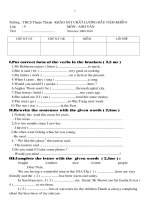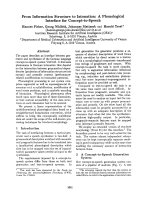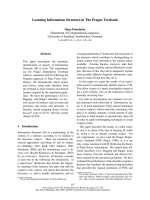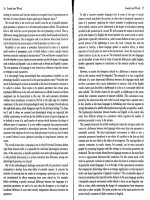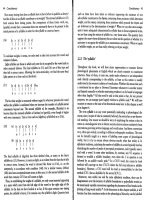English information structure
Bạn đang xem bản rút gọn của tài liệu. Xem và tải ngay bản đầy đủ của tài liệu tại đây (118.91 KB, 25 trang )
GRADUATE ACADEMY OF SOCIAL SCIENCES
ACADEMIC WRITING
Đặng Nguyên Giang, Ph.D.
REFERENCING
- In-text citations
- References
In-text citations
• What do in-text citations include?
• How many kinds of in-text citations are there?
In-text citations
In-text citations include information about a
source within the text such as the name of the
author or authors, the year of publication, and the
page number. There are two kinds of in-text
citations: the exact words from the source (direct
citations) and the paraphrase of the source in
your own words (indirect citations).
Direct citations
There are some notes when giving the direct citations as follows:
Short quotations (up to four lines) are enclosed in double quotation marks.
Longer quotations are indented five spaces as a block with no quotation
marks. Space lines need doubling in a block quotation.
Author, year, and page number(s) are cited for all quotations. In parentheses,
information not mentioned in the text is included; for instance, if the authors’
name is in the text, there is no need to repeat it in parentheses.
Three ellipsis points (…) indicate words omitted from/within a sentence.
Four ellipsis points (….) show omission of words between sentences.
Square brackets are used to enclose material that is not part of the original
quotation.
Within double quotation marks, single quotation marks are used for quoted
material or words that would otherwise be in double quotation marks. Within a
block quotation, double quotation marks are used.
Examples
Direct citation example 1:
They comments, “The most satisfying and
sensitive criterion to establish idiomaticity is
undoubtedly the semantic one” (Fernando &
Flavell, 1981, p. 32).
Direct citation example 2:
According to Fernando & Flavell (1981),
“The most satisfying and sensitive criterion to
establish idiomaticity is undoubtedly the
semantic one” (p. 32).
Direct citation example 3:
Fernando & Flavell (1981) regard an idiom as
a lexeme and give their own conclusions as
follows:
We have examined several issues which focus
attention on the idiom as a single lexeme that is
non-correlative in its syntax and therefore nonliteral in terms of its constituents. The most
satisfying and sensitive criterion to establish
idiomaticity is undoubtedly the semantic one (p.
32).
Direct citation example 4:
According to Krzeszowski (1990, p. 35), “No
exact or reliable exploration of facts can be
conducted without a theoretical background,
providing concepts, hypotheses, and theories
which enable the investigator to describe the
relevant facts and to account for them in terms of
significant generalizations” (cited in Nguyễn
Văn Trào, 2009, p. 12).
Indirect citations
The author’s last name, the year of publication
and, whenever possible, the page numbers are
cited.
Examples
The author’s last name, the year of publication
and, whenever possible, the page numbers are
cited. What is not mentioned in the text is placed
in parentheses as in these examples:
Lee (1981) states that…
It is claimed (Lee, 1979) that…
Sometimes both year and date are in the text;
therefore, nothing is added in parentheses:
In 1968, Lee denied that…
With page numbers, the above examples
would appear like this:
Lee (1981, p. 76) states that…
It is claimed (Lee, pp. 22-24) that…
In 1968, Lee (pp. 201-202) denied that…
When there are two authors, both names are
given every time they are cited. However, where
there are more than two authors, all the authors’
names are given, when they are first cited.
Thereafter, only the first author’s name is used,
and “et al” is added. For example, a first citation
might be:
Nunberg, Geoffrey, Sag and Wasow (1994)
noted that…
and a later citation of the same work would be:
Nunberg et al. (1994) also noted that…
When one author has published more than one
work in the same year, the letters (a, b, c, etc.)
are added to the year in reference citation and to
the year in the listing of these items in the
references:
Peterson (1982b, p. 602) explains the…
When citing something indirectly, one of these
examples can be followed:
Jones (1928, p. 26) quotes Smith as saying…
Smith (quoted by Jones, 1928, p. 26) states…
Smith is cited by Jones (1928, p. 26) as
stating…
Here are two more examples:
Traditionally, it is believed that idioms are
unpredictable or non-compositional (Chafe, 1970;
Chomsky, 1965/1980; Katz, 1973; Fernando & Flavell,
1981; Nguyễn Văn Mệnh, 1972; Đỗ Hữu Châu, 1981;
Nguyễn Công Đức, 1995; Hoàng Văn Hành, 2008; etc.).
In discovery into the unknown world, idioms reflect
the transformation in conceptualization of the world
around and the association between the human beings
and the universe. Therefore, idioms which are regarded
as a form of a language reflect culture in a concentrated
way (cited in Zhang, 2007, pp. 31-62).
Footnotes
Footnotes may explain or amplify material in
the text, but they are distracting to a reader.
Whenever possible this information should be
made part of the text. When used, they appear
after the reference list. Such footnotes are
numbered and are referred to in the text by a
raised number, for example:
would further the development of ideas22 and
…
References
Foreign authors
Book reference
Citing a book in print
APA format structure:
Author, A. (Year of Publication). Title of Work. Publisher
City/State: Publisher.
APA format examples:
Taylor, J. R. (2002). Cognitive Grammar. Oxford: Oxford
University Press.
Fernando, C., & Flavell, R. (1981). On Idiom: Critical Views
and Perspectives (Exeter Linguistics Studies, 5). Exeter:
University of Exeter.
Cowie, A. P., et al. (1993). Oxford Dictionary of English
Idioms. Oxford: Oxford University Press.
Citing an e-book from an e-reader
E-book is short for “electronic book.” It is a digital
version of a book that can be read on a computer, ereader (Kindle, Nook, etc.), or other electronic device.
APA format structure:
Author, A. (Year of Publication). Title of Work [EReader Version]. Retrieved from http://xxxx or
DOI:xxxx
APA format example:
Eggers, D. (2008). The Circle [Kindle Version].
Retrieved from />
Citing a book found in a database
APA format structure:
Author, A. (Year of Publication). Title of
Work. Retrieved from http://xxxx or DOI:xxxx
APA format example:
Sayre, R.K., Devercelli, A.E., Neuman, M.J.,
& Wodon, Q. (2015). Investment in Early
Childhood Development: Review of the World
Bank’s Recent Experience. DOI: 10.1596/978-14648-0403-8
Journal article reference
Citing a journal article in print
APA format structure:
Author, A. (Year of Publication). Article title. Periodical
Title, Volume (Issue), pp.-pp.
APA format examples:
Greenbaum, S. (1974). Some verb-intensifier collocations in
American and British English. American Speech, 49, 79-89.
Katz, J. J. & Fodor, J. A. (1963). The structure of a semantic
theory. Language, 39 (2), 170-210.
Nevin, A. (1990). The changing of teacher education special
education. Teacher Education and Special Education: The
Journal of the Teacher Education Division of the Council for
Exceptional Children, 13 (3-4), 147-148.
Nunberg, G., et al. (1994). Idioms. Language, 70, 491-538.
Citing a journal article found online
APA format structure:
Author, A. (Year of Publication). Article
title. Periodical Title, Volume(Issue), pp.-pp.
DOI:XX.XXXXX or Retrieved from journal URL
APA format example:
Jameson, J. (2013). E-Leadership in higher
education: The fifth “age” of educational technology
research. British Journal of Educational Technology, 44
(6), 889-915. DOI: 10.1111/bjet.12103
Vietnamese authors
Book reference
Format structure:
Author’s full name (Year of Publication). Title of work
[English translated version]. Publisher City: Publisher.
Format examples:
Hoàng Văn Hành (2008). Thành ngữ học tiếng Việt
[Vietnamese Idiom Studies]. Hanoi: Social Sciences Publishing
House.
Nguyễn Lực & Lương Văn Đang (2009). Thành ngữ tiếng
Việt [A Dictionary of Vietnamese Idioms]. Hanoi: Social
Sciences Publishing House.
Nguyễn Như Ý, et al. (1998). Từ điển giải thích thành ngữ
tiếng Việt [A Dictionary of Vietnamese Idioms]. Hanoi: Vietnam
Education Publishing House.
Journal article reference
Format structure:
Author’s full name (Year of Publication). Article
title
[English
translated
version]. Periodical
Title, Volume (Issue), pp.-pp.
Format examples:
Phạm Xuân Thành (1993). Cơ sở hình thành và biến
đổi của thành ngữ tiếng Việt [Grounds for the Formation
and Variation of Vietnamese Idioms]. Journal of
Folklore, 1, 55-58.
Lý Toàn Thắng & Ly Lan (2011). Chiếu xạ trong các
ẩn dụ ý niệm về tình cảm [Illumination in Conceptual
Metaphors on Feelings]. Journal of Lexicography &
Encyclopedia, 6, 89-99.
Unpublished work reference
Format structure:
Author’s full name (Year of Declaration). Title of
Work. Unpublished title, Place of Declaration.
Format examples:
Nguyễn Cơng Đức (1995). Bình diện cấu trúc hình
thái-ngữ nghĩa của thành ngữ tiếng Việt [Vietnamese
Idioms from Formal-Semantic Perspectives]. Unpublished
doctoral dissertation, Institute of Linguistics.
Nguyễn Văn Trào (2009). Emotion Expressing Idioms
in English and Vietnamese: A Contrastive Analysis.
Unpublished doctoral dissertation, The University of
Queensland.
